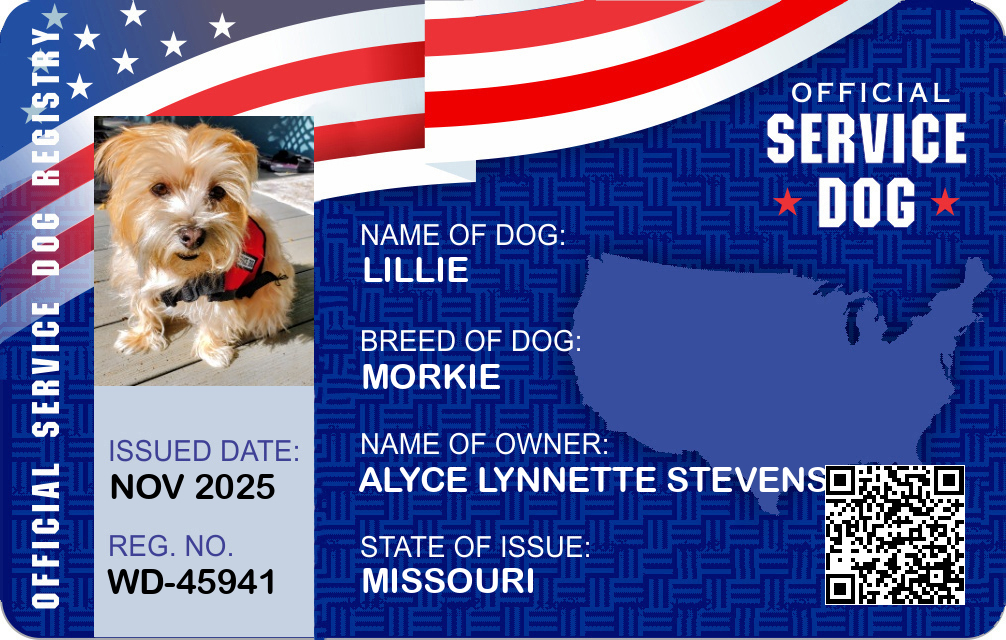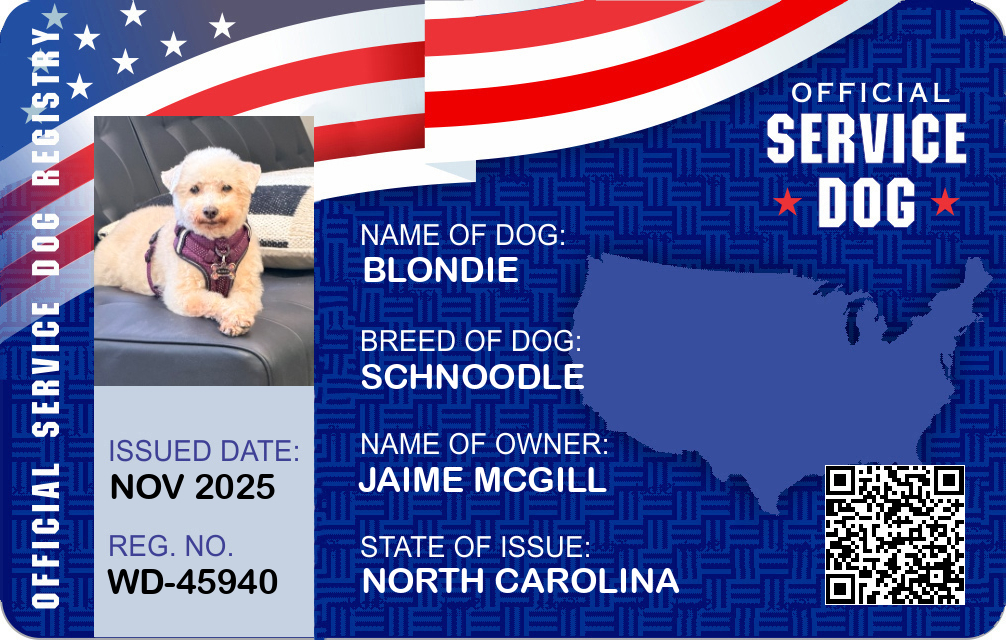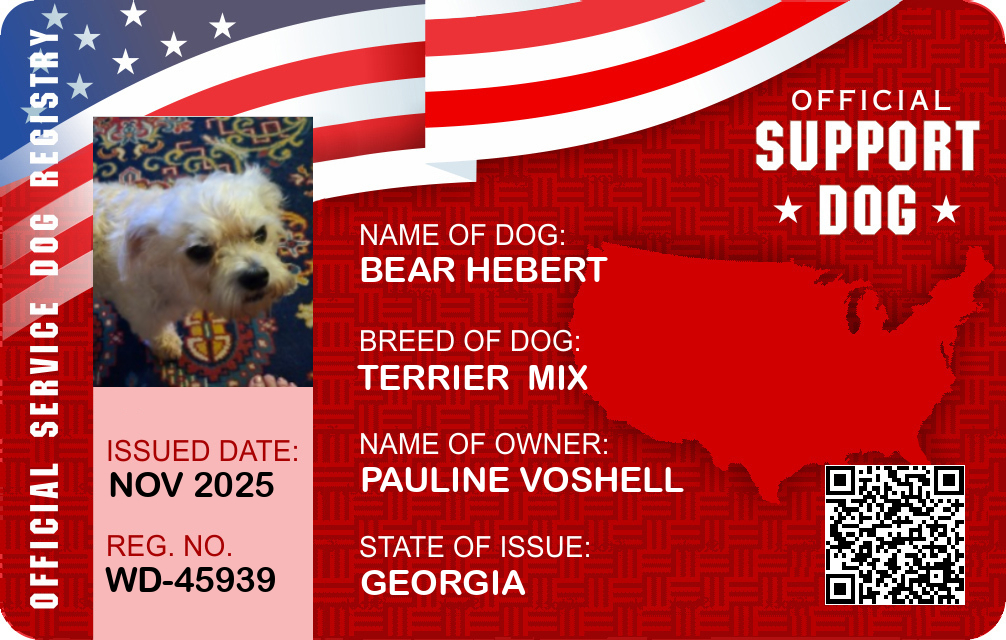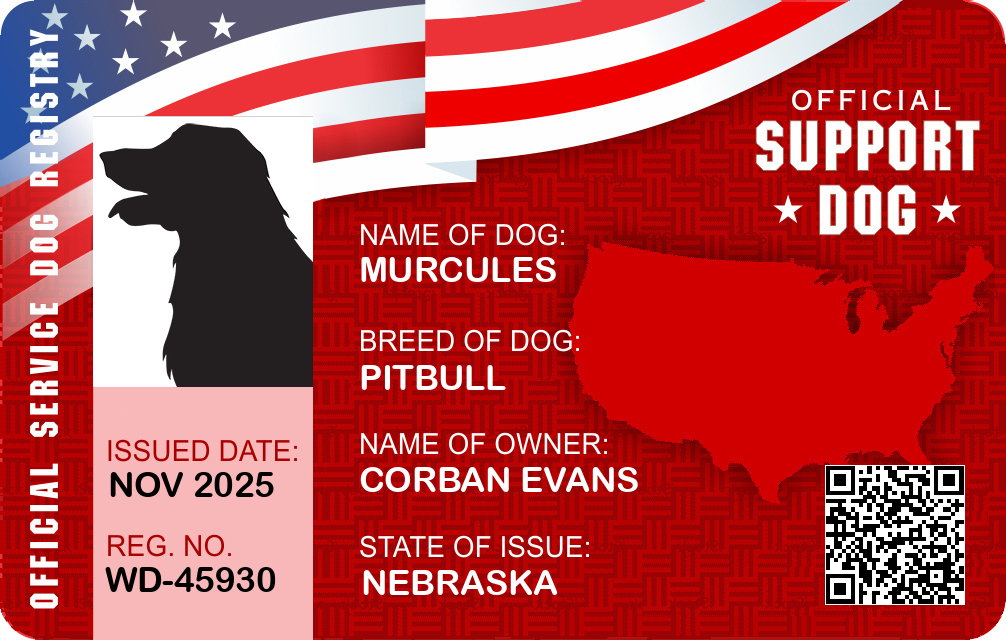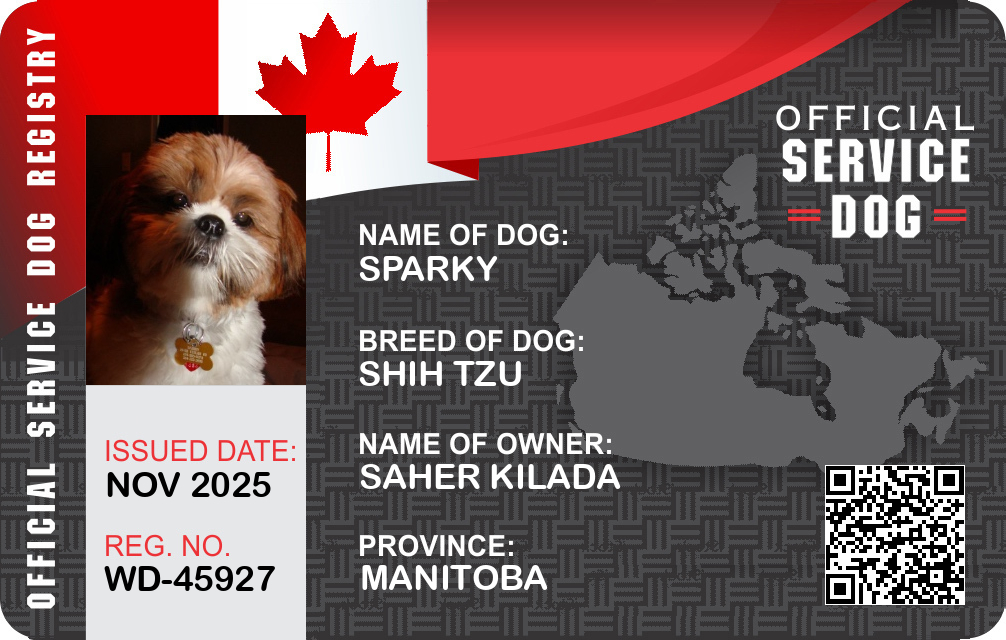Delaware Service Dog Laws
Register Your Dog

Overview of Service Dog and Legal Definitions in Delaware
What is a Service Dog?
In Delaware, as in the rest of the United States, a service dog is defined under the Americans with Disabilities Act (ADA) as a dog that has been individually trained to perform tasks for a person with a disability. These tasks directly relate to the individual’s disability, ranging from guiding those who are visually impaired to alerting individuals with hearing impairments or performing various tasks for those with mobility challenges. The essential component of the service dog’s role is that the work or tasks the dog performs must be directly related to the handler’s disability, making these animals crucial in providing independence and safety to their handlers.
How Service Dogs Differ from Other Types of Assistance Animals
It’s essential to understand the distinction between service dogs and other types of assistance animals, such as emotional support animals (ESAs) or therapy animals. Unlike service dogs, which perform specific tasks, ESAs provide comfort merely through their presence and are not required to be trained for specific tasks related to a disability. Therapy animals, conversely, are used in facilities to provide therapeutic support to multiple individuals and do not have the right to accompany handlers in public spaces under the ADA. Delaware follows these definitions, thereby significantly affecting where these animals can accompany their owners and the rights afforded to them.
Key Federal Laws Affecting Service Dogs (e.g., ADA, FHA, ACAA)
Several federal laws apply to service dogs, with the ADA being the most significant. The ADA establishes the rights of individuals with service dogs to access public accommodations without facing discrimination. Additionally, the Fair Housing Act (FHA) provides provisions allowing service dogs in housing situations, even if the property has a no-pet policy. The Air Carrier Access Act (ACAA) governs the rights of service dogs and their handlers concerning air travel, ensuring they can fly without additional charges typically applied to pets. Delaware state laws complement these federal regulations, ensuring consistent protection for handlers and their service animals.
State-Specific Service Dog Laws in Delaware
Delaware has adopted legislation that aligns closely with federal standards, with some additional state-specific stipulations to enhance clarity and protection for service dog handlers. Delaware law reinforces the requirement that service dogs must be trained to perform specific tasks and must be well-behaved and under control at all times. These state-specific nuances ensure handlers and establishments adhere to clear standards and maintain the welfare of individuals relying on service dogs.
Housing Rights and Responsibilities
In terms of housing, Delaware service dog handlers are protected under the FHA, which mandates that landlords must make reasonable accommodations in their policies to allow service dogs, even if the property has restrictions on animals. This extends to prohibiting extra fees or deposits, ensuring that those with disabilities can obtain housing without being financially burdened. Landlord knowledge and understanding of service dog laws are crucial to prevent any possible disputes or legal infringements.
Public Access and Accommodation
Regarding public access, Delaware service dogs are permitted in all areas open to the public under the ADA and state law. This includes restaurants, hotels, stores, hospitals, and other facilities. Establishments must allow access to service dogs alongside their handlers, and charges or fees for pets should not be applied. Misunderstandings may occur and it is beneficial for both handlers and businesses to know these rights, thus avoiding potential legal issues.
Transportation and Travel Rules
Delaware’s service dog regulations align with the ACAA, allowing service dogs to accompany their handlers in the cabin of airplanes and other public transportation vehicles without incurring pet-related fees. Transportation providers must accommodate passengers with disabilities, facilitating access for service dogs and not differentiating based on breed or size unless there are specific safety concerns. Proper documentation may be requested to verify the service dog’s status tentatively.
Employment and Workplace Considerations
In the workplace, service dog handlers in Delaware are protected under the ADA, requiring employers to accommodate service dogs unless doing so would cause undue hardship to the operation of the business. This includes considerations such as workplace layout and any potential health and safety concerns. Handlers should be prepared to discuss their requirements with employers and ensure that the service dog’s presence does not disrupt business operations.
Documentation, Requirements, and Processes in Delaware
Service Dog Documentation and Who Can Issue It
While handlers should not be required to provide documentation for their service dogs under the ADA to access public places, they might be asked two specific questions: if the dog is a service animal required because of a disability and what tasks the dog is trained to perform. In certain cases like housing or air travel, documentation supporting the requirement of the dog as an accommodation may be requested. This documentation can typically be provided by healthcare providers familiar with the individual’s disability needs.
Landlord, Business, and Provider Verification Rules
Landlords and businesses in Delaware should understand that imposing excessive requirements for documentation or verification is not permitted. They are allowed to make limited inquiries to verify the function of the service dog but must respect privacy and not demand significant proof of certification or training which is not legally required. These guidelines aim to maintain a balance between ensuring legitimate service dog use and protecting the rights of individuals with disabilities.
Rights, Limitations, and Legal Risks
Rights Service Dog Handlers Have in Delaware
Handlers of service dogs in Delaware have extensive rights encompassing access to public spaces, housing, employment, and transportation without facing discrimination. These rights enable individuals with disabilities to participate in social and economic activities equally, reflecting legislative intent both federally and within the state to uphold these principles.
Limits on Service Dog Protections and Common Restrictions
While substantial rights exist, there are still limitations; a service dog must be under control and not pose a direct threat to others. Handlers are responsible for ensuring that their dogs meet behavioral standards, as poorly behaved or disruptive animals may legally be excluded. Additionally, service dogs are not required to be accommodated in areas where their presence would fundamentally alter the nature of a service or pose genuine sanitary risks, such as in certain medical or sterile environments.
Penalties for Fraud or Misrepresentation
Delaware imposes penalties for individuals who misrepresent their pets as service dogs. This fraudulent activity can undermine the credibility of service dog handlers and potentially jeopardize genuine access rights. Legal consequences can include fines and penalties, serving as deterrents against dishonest behavior. The intent is to protect legitimate service dog handlers and uphold the integrity of disabilities accommodations.
Practical Guidance for Service Dog Handlers in Delaware
How to Qualify for a Service Dog Legitimately
To qualify for a service dog legally, individuals in Delaware must have a disability where a service animal can assist in mitigating the disability through specific tasks. Engaging a certified service dog trainer who has experience in training dogs for specialized tasks is typically required. This approach safeguards the animal’s ability to perform the necessary functions, ensuring alignment with legal standards.
How to Talk to Landlords, Airlines, and Employers
Communication with landlords, airlines, and employers should be straightforward, emphasizing the legal rights afforded to service dog handlers. Being prepared with necessary documentation and an understanding of specific rights can greatly assist in managing interactions effectively. Clear communication ensures understanding and adherence to legal standards, potentially reducing conflict and fostering positive relationships.
Summary of Service Dog Laws in Delaware
**
- Definition: A service dog in Delaware is a trained animal that performs tasks related to a person’s disability, distinguishing it from other assistance animals.
- Federal Interaction: Delaware service dog laws align with ADA, FHA, and ACAA, providing consistent access and accommodations.
- Rights: Include public access, housing without pet restrictions, non-discriminatory employment conditions, and free air travel.
- Limitations: Control and behavior standards must be maintained; access is limited where essential functions or safety are compromised.
- Documentation: Limited to specific questions or reasonable verification; excessive demands are inappropriate.
- Penalties: Delaware penalizes misrepresentation of pets as service animals to uphold the integrity of legal protections.
- Practical Steps: Use licensed trainers, understand legal rights, communicate clearly with landlords and employers, and maintain thorough documentation where necessary.
**
This guide serves to empower service dog handlers in Delaware by providing a comprehensive understanding of their rights and responsibilities, emphasizing legal compliance and respectful interactions in various domains.



